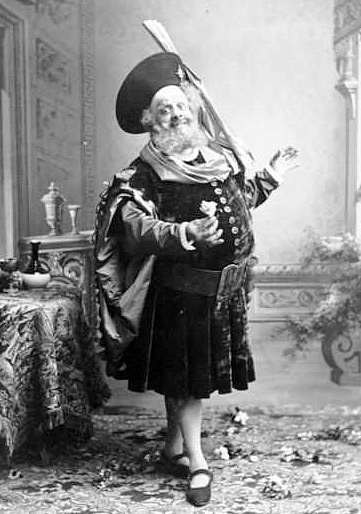
Lucien Fugère in Verdi’s Falstaff
Verdi’s Falstaff, Staatsoper Berlin, Wednesday 28th March 2018, director Mario Martone, conducted by Daniel Barenboim, reviewed by TONY COOPER
Verdi’s Falstaff mirrors the two buses scenario for me this year. Up until now I haven’t caught a production of this opera since Glyndebourne came to my home city of Norwich in 2009. However, I saw 2018 in by attending a production by Opera Vlaanderen in Antwerp, directed by Christoph Waltz and now this brand-new production in Berlin, directed with Italianate flair by the Napoli-born film director, Mario Martone, forming part of Daniel Barenboim’s Festtage, an Eastertide festival for Berliners and visitors alike.
The libretto by Arrigo Boito of this well-loved opera is loosely based on Shakespeare’s The Merry Wives of Windsor as well as scenes from Henry IV (parts I & II). It was written when Verdi was approaching the ripe old age of 80. It was his second comedy and his third work based on a Shakespeare play, following Macbeth and Othello.
In Falstaff, there are none of the long, passionate melodies that one encounters in La traviataor or, for that matter, Il trovatore but nonetheless, the opera is filled with wit and high spirits.
The action revolves round the thwarted and sometimes farcical efforts of the knight of Windsor, Sir John Falstaff, who at one time acted as the dashing young page to the Duke of Norfolk. His herculean efforts to seduce two married women to gain access to their husbands’ wealth come to nothing.
But in this production, the fat-old knight no longer fits that description, for in Martone’s highly-entertaining, stylish and contemporary production, Falstaff comes in the guise of a slim-looking rocker kitted out in biker’s gear. Rough trade sometimes fits the bill but it is unimaginable to think that such refined and well-to-do ladies as Mrs Alice Ford and Mrs Meg Page would want anything to do with this scoundrel.
Falstaff’s old stamping-ground, The Garter Inn, is now represented by a drinking den extravagantly named the Panoramic Bar, a seedy local with its name punctuated by italicised lettering blazoned across the door in shocking-pink neon and located in an unfashionable part of town. Here Falstaff reigns supreme with his boozing pals, Bardolfo and Pistola, well played and acted by Stephan Rügamer and Jan Martiník. Wildly dressed, they proved a rich and entertaining deuce and bounced off each other amusingly. Mrs Quickly was brilliantly portrayed by Daniela Barcellona, whose deep mezzo voice was enchanting.
Cunning, manipulative and crafty as befits her role, she presents as a well-dressed and astute modern businesswoman always one jump ahead of Falstaff. And Barbara Frittoli and Katharina Kammerloher as Mrs Alice Ford and Mrs Meg Page, respectively, played their roles to the full. And when the trio of women get together they proved a formidable and powerful force delivering the goods not only from a musical point of view but also from a feminist standpoint.
In contrast to Falstaff and his bawdy pals’ shabby residence, Mr and Mrs Ford occupy opulent surroundings as befits their supposedly superior status. Their ultra contemporary living space is well equipped with the luxuries that wealth bestows, such as a gym and a swimming-pool (L-shaped, the latest fashion!) and a servant to boot. In one scene, Mrs Ford scrutinises the markets in the pages of The Financial Times.
There were numerous telling scenes in this production but none more so than the well-loved scene in Windsor Park where poor old Falstaff – the role superbly played and acted by the powerful German baritone, Michael Volle, a well-respected Wagnerian singer – is ridiculed.
The ingenious set designed by Margherita Palli was far away from the traditional idyllic forest clearing and more akin to a fire fighters’ training tower. People of the night gathered incognito with couples and threesomes moving in and out of the shadows simulating polymorphously perverse sexual acts. The girls were erotically attired in black latex gear designed by Ursula Patzak.
Alfredo Daza, a popular singer of Staatsoper Berlin, put in a perfect performance as Ford singing the role with total conviction, while Francesco Demuroa’s interpretation of Fenton was laudable as was Nadine Sierra’s reading of Nannetta. Her crystal-clear soprano voice was heard to good effect in the final scene. Jürgen Sacher’s portrayal of Mrs Quickly’s servant, Dr Cajus, was likewise admirable, especially in the opening scene in which he is duped by Falstaff and his cronies during a rowdy drinking session.
This is an opera with a fairy-tale ending in the final scene with everyone reconciled. Falstaff proclaims that the world is nothing more than a joke. And Verdi ends his long and glorious operatic career with a magnificent fugue in nine parts which was brilliantly performed by Daniel Barenboim, that dynamo of the pit. Full credit also to Martin Wright who brought the Staatsopernchor to a high level of performance.
Overall, I enjoyed Mario Martone’s production, staged in modern dress, but Christoph Waltz at Antwerp better captured the aristocratic and quirky character of Sir John Falstaff.
Tony Cooper is QR‘s opera critic










